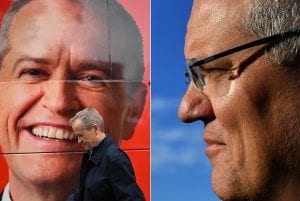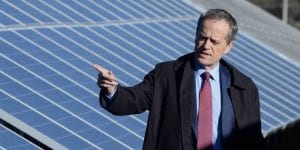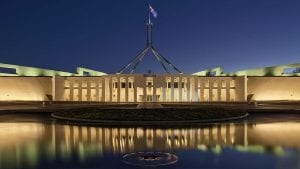The Coalition looks set to form a majority government in the 46th Parliament, following the 2019 Federal Election.
As of Monday morning, the Australian Electoral Commission is showing the Coalition ahead in a total of 77 seats, which would put Prime Minister Scott Morrison in a position to be returned with an outright majority.
The 2019 election had been contested on a few core issues, with Labor promising an expansive policy platform that included stronger action on climate change and increased spending on welfare programs.
The Coalition principally spent the election countering Labor’s offering, promising to preserve retiree tax concessions and ran a scare campaign based on the “costs” of Labor’s climate change policies.
Polls and betting markets both pointed to a Labor victory, with the party expected to gain ground in southern states, while it would likely struggle in Queensland’s coal regions.
However, the anticipated swings to the Labor party have not materialised, with Labor failing to gain any seats in Victoria, despite having achieved a strong result at a recent State election.
Many pundits had expected the Coalition to struggle in southern States where climate change had been a prominent issue.
The Coalition looks to have picked up two extra seats in each of Tasmania and Queensland.
The result in New South Wales balanced itself out, with the Coalition losing the seats of Warringah and Gilmore but gained the seats of Lindsay and Wentworth.
The result in Warringah will see former Prime Minister Tony Abbott replaced by independent Zali Steggall.
While this is a win for a strong pro-climate change campaigns run in the Sydney North Shore seat, Scott Morrison will likely be relieved to see the back of Abbott, who has largely been a distraction, rather than asset, after being confined to the backbench.
At this stage, it appears that independent Kerryn Phelps will not be re-elected and is expected to concede to Liberal challenger Dave Sharma, after Phelps won the seat of Wentworth at a by-election following Malcolm Turnbull’s retirement from politics.
Labor leadership
During his concession speech, Bill Shorten announced that he would be standing aside as leader of the Australian Labor Party.
It already appears that this will be a hotly contested leadership election, with deputy leader Tanya Plibersek and Anthony Albanese already putting their hands up for the role.
Both Plibersek and Albanese are from Labor’s left faction.
There is speculation that shadow Treasurer Chris Bowen and former Defence Minister Joel Fitzgibbon will nominate. Both are members of Labor’s right faction.
Whoever emerges as the new Labor leader will need to reinvent the party, after six years of ambitious, albeit unpopular leadership by Bill Shorten.
Some within the Labor ranks have suggested that the party tried to do too much at the election. Prominent Labor Right faction member Joel Fitzgibbon has called on Labor to return to the “sensible centre”, while ACT Senator Katy Gallagher has said Labor platform was “really busy and really crowded”.
The Senate
It appears that no party will command a majority in the upper house, with an otherwise depleted crossbench retaining the balance of power.
After the weekend, it appears that the Coalition will hold 34 senate seats, the Labor Party 27 and the Greens nine.
The likely outcome at this stage will see six members of the crossbench, made up of two Centre Alliance senators, two from One Nation, Cory Bernardi for the Australian Conservatives and a re-elected Jacquie Lambie in Tasmania.
Despite election expenditure that would match the two major parties, miner Clive Palmer has walked away from the election empty-handed.
Palmer is likely to have still influenced the outcome, with his omnipresent advertising attacking the Labor party channelling disaffected voters back to the Coalition.
A total of 39 votes are required to pass legislation through the Senate.










